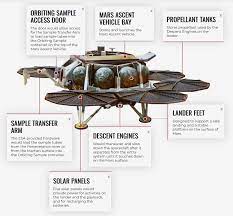NASA Mars Sample Return: Geisel Software’s Vital Contribution to Martian Exploration
Mars Sample Return Mission Challenge
In the quest to expand our understanding of Mars, NASA’s Mars 2020 rover, Perseverance, has been diligently collecting rock samples on the Martian surface. These samples, potentially holding secrets to the planet’s history and the broader cosmos, are stored in tubes, some within the rover and others at a designated sample depot.
The MSR mission’s ambition is to retrieve these samples and bring them back to Earth for analysis. The scientific community has identified this mission as the top priority in the “2023–2033 Planetary Science Decadal Survey” by the National Academy of Sciences, Engineering, and Medicine, underscoring its importance for planetary science. This multi-agency, multi-step operation involves deploying the Sample Retrieval Lander (SRL) – set to be the largest object ever soft-landed on another planet. The mission’s complexity and high costs, coupled with stringent congressional budget oversight, present significant challenges, emphasizing the need for flawless execution and cost-effective strategies at every stage, from sample collection to Earth re-entry.
Solution
Geisel Software contributed significantly to the MSR mission, particularly in the development of test racks for the SRL. These test racks were crucial for emulating the flight conditions under harsh Martian environments and validating the hardware and software designed for the mission. The company’s specific roles included:
- Design and Development: Creating test racks that accurately simulated the flight conditions of the SRL, ensuring that every possible scenario could be tested and validated. This increased the reliability of the mission, reducing the likelihood of failures and ensuring that the mission objectives could be achieved.
- Testing and Refinement: Conducting extensive testing to ensure that both flight hardware and software would function flawlessly in space. This involved continuous iteration and improvement of the test racks. This rigorous approach ensured that every aspect of the SRL’s functionality was tested under the most extreme conditions imaginable, significantly reducing the risk of failure during the actual mission.
- Collaboration: Working closely with other teams responsible for the direct interfacing code with the flight hardware, ensuring seamless integration and functionality of all components. This coordination was essential for the success of the mission, as it ensures that all parts of the MSR mission work together harmoniously, from launch to landing and sample retrieval.
Results
Geisel Software’s contributions to the Mars Sample Return (MSR) project significantly advanced the mission’s capabilities. Their development of test racks for the Sample Retrieval Lander (SRL) ensured that the mission’s critical hardware and software could withstand the harsh conditions of space and the Martian environment. This led to enhanced reliability and robustness in mission-critical systems. Moreover, their efforts in streamlining the testing process played a crucial role in managing the project’s escalating costs. By setting high standards in testing and development, Geisel Software not only bolstered the chances of a successful MSR mission but also laid the groundwork for future interplanetary exploration, demonstrating the pivotal role of precise engineering and innovation in the realm of space exploration.
The meticulous design and testing processes implemented by Geisel Software have provided a robust foundation for the SRL’s performance. These efforts have not only improved the immediate chances of success for the MSR mission but have also set a precedent for future missions. By addressing the technical and logistical challenges of space exploration with innovative solutions, Geisel Software has showcased the critical importance of high-quality engineering and collaborative efforts in achieving groundbreaking scientific goals.

